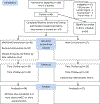A randomized controlled trial of a cognitive rehabilitation intervention for persons with multiple sclerosis
- PMID: 22301679
- PMCID: PMC7254958
- DOI: 10.1177/0269215511434997
A randomized controlled trial of a cognitive rehabilitation intervention for persons with multiple sclerosis
Abstract
Objective: To explore the feasibility and effects of a computer-assisted cognitive rehabilitation intervention - Memory, Attention, and Problem Solving Skills for Persons with Multiple Sclerosis (MAPSS-MS) - for persons with multiple sclerosis on cognitive performance, memory strategy use, self-efficacy for control of symptoms and neuropsychological competence in activities of daily living (ADL).
Design: A randomized controlled single-blinded trial with treatment and wait list control groups.
Setting: Southwestern United States.
Subjects: Convenience sample of 61 persons (34 treatment, 27 wait list control) with multiple sclerosis (mean age 47.9 years, SD 8.8).
Intervention: The eight-week MAPSS-MS intervention program included two components: (a) eight weekly group sessions focused on building efficacy for use of cognitive compensatory strategies and (b) a computer-assisted cognitive rehabilitation program with home-based training.
Outcome measures: A neuropsychological battery of performance tests comprising the Minimal Assessment of Cognitive Function in Multiple Sclerosis (MACFIMS) and self-report instruments (use of memory strategies, self-efficacy for control of multiple sclerosis and neuropsychological competence in ADL) were completed at baseline, two months (after classes), and at five months.
Results: Both groups improved significantly (P < 0.05) over time on most measures in the MACFIMS battery as well as the measures of strategy use and neuropsychological competence in ADL. There was a significant group-by-time interaction for scores on the measures of verbal memory and the use of compensatory strategies.
Conclusions: The MAPSS-MS intervention was feasible and well-accepted by participants. Given the large relative increase in use of compensatory strategies by the intervention group, it holds promise for enhancing cognitive function in persons with multiple sclerosis.
Conflict of interest statement
Comment in
-
Computer-based cognitive exercises plus group classes for generalisation improved verbal memory and use of memory strategies by people with multiple sclerosis.Aust Occup Ther J. 2013 Apr;60(2):150-1. doi: 10.1111/1440-1630.12036. Aust Occup Ther J. 2013. PMID: 23551010 No abstract available.
References
-
- World Health Organization & Multiple Sclerosis International Foundation. [cited 2008] Available from http://www.msif.org/en/about_msif/what_we_do/atlas_of_ms/.html.
-
- Trapp BD, Peterson J, Ransohoff RM, Rudick R, Mörk S and Bö L. Axonal transection in the lesions of multiple sclerosis. N Eng J Med 1998; 338(5): 278–285. - PubMed
-
- O’Brien AR, Chiaravalloti N, Goverover Y and DeLuca J. Evidenced-based cognitive rehabilitation for persons with multiple sclerosis: a review of the literature. Arch Phys Med Rehabil 2008; 89(4): 761–769. - PubMed
-
- Goretti B, Portaccio E, Zipoli V, et al. Impact of cognitive impairment on coping strategies in multiple sclerosis. Clin Neurol Neurosurg 2010; 112(2): 127–130. - PubMed
Publication types
MeSH terms
Grants and funding
LinkOut - more resources
Full Text Sources
Medical


